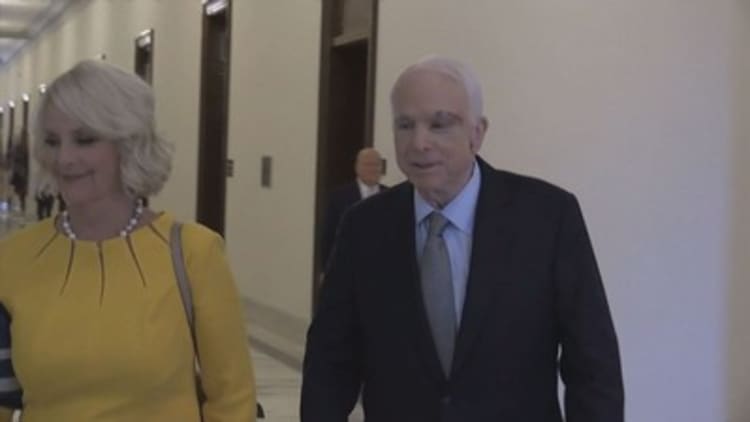Three Republican senators who bucked their own party in recent months to effectively save Obamacare now say they are going to vote for a tax bill that would gut Obamacare.
The surprising about-face in the past two days by Sens. John McCain of Arizona, Alaska's Lisa Murkowski and, finally on Friday, Susan Collins of Maine guarantees that GOP leaders in the Senate will win passage of their major tax legislation.
And it very well could mean that Americans would no longer be required to have some form of health insurance that complies with Obamacare standards or face a tax penalty.
If that happens, the Congressional Budget Office has projected, 13 million more people will not have health insurance by 2027 than are currently expected. Most of those coverage losses would result from elimination of the penalty for not having insurance, the CBO has said.
The nonpartisan agency also has estimated that individual insurance plan premiums will be about 10 percent higher annually than if the mandate remained in place.

The Republican trio since last summer had formed a firewall for their fellow party members' efforts to repeal and replace major parts of the Affordable Care Act with new health-care legislation. The three holdouts were reluctant to pass a bill that would lead to steep coverage losses and big premium hikes, among other consequences.
McCain, in particular, stunned other Republicans and infuriated President Donald Trump when he dramatically pointed his thumb down on the Senate floor in an early morning vote July 28 to kill one repeal bill.
Without the trio, GOP Senate leaders were not able to cobble together the minimum 50 Republican senators needed to pass an Obamacare replacement, assuming a tiebreaking vote by Vice President Mike Pence. Because of that, health-care reform looked dead for Republicans for the rest of the year.
But in recent weeks, the idea of repealing Obamacare's individual mandate, which requires health coverage for most people, was included in the Senate's version of the tax bill.
The mandate's revocation was added to the bill because it would free up nearly $340 billion in extra federal funds during the next decade, which could be used to provide bigger tax breaks in the legislation. The savings would result from the federal government not having to subsidize as many Obamacare private insurance plans as it does now.
Murkowski, on Wednesday, became the first of the trio to endorse the tax bill, despite its inclusion of the mandate's repeal.
McCain followed suit on Thursday.
In doing so, he called the individual mandate "an onerous tax that especially harms those from low-income brackets."
Collins joined them on Friday afternoon, hours after Senate Majority Leader Mitch McConnell, R-Ky., announced that "we have the votes" to pass the tax bill.
McConnell had enough votes without Collins, as a number of other GOP holdouts on the tax bill had switched to supporting it.
In a statement on her website, Collins said she "was deeply concerned that the repeal of the individual mandate would almost certainly lead to further increases in the cost of health insurance premiums — premiums that are already too expensive under the ACA."
But Collins said she was "very pleased" that McConnell has committed to support two other bills before the end of the year "to mitigate these increases."
One of those bills, known as Alexander-Murray, would restore federal reimbursements to insurers for discounts they give many Obamacare customers in their out-of-pocket health charges. The other bill would provide $10 billion in funding over two years to support reinsurance programs to lower the cost to insurers from customers with heavy medical needs.
But Obamacare experts have said that passing Alexander-Murray will not do much, at all, to keep premiums down if the mandate is repealed. And they also have said Collins' reinsurance bill, while helping mitigate premium hikes somewhat, does not allocate enough money, and expires too soon, to completely offset the premium spike forecast by the CBO.
A final vote on the tax bill is expected later Friday.
A House version of the tax bill does not include repeal of Obamacare's individual mandate. But the Republican-controlled House earlier this year passed an Obamacare replacement bill that would have repealed the mandate.
That makes it more likely that repeal of the mandate will be included in the final version of the tax bill, which both the House and Senate would need to approve before sending it to Trump to sign into law.


